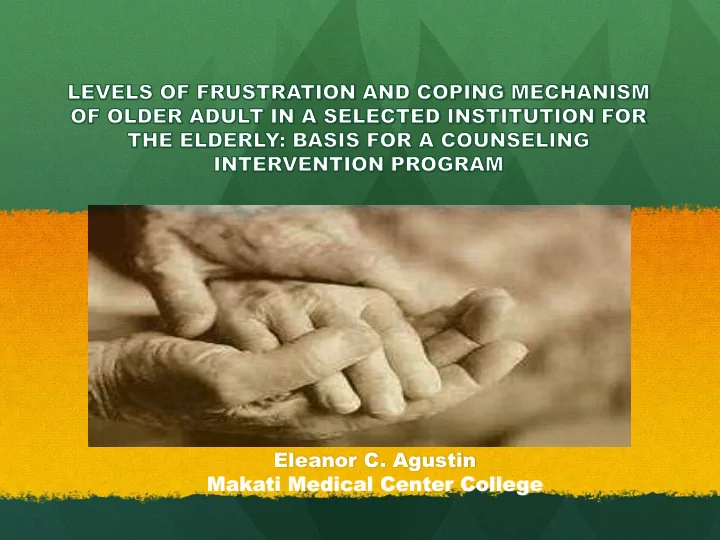

Eleanor C. Agustin Makati Medical Center College
The study looked into the levels of frustration and coping mechanisms of older adults in a selected institution for the elderly in manila, Philippines
There were 35 participants involved in the study 15 were male and 20 were female All of which came from Golden Acres which is an institution for the elderly located in Quezon City , Philippines
De Demog mographic phics s of of the the par particip ticipant ants Marital Relationship Children/Parents Financial Bereavement Life transition Painful Memories
Task Oriented coping Emotion oriented coping Avoidance oriented coping
The task-oriented strategy is problem-focused. It involves taking direct action to alter the situation itself to reduce the amount of stress it evokes. In the emotion-oriented strategy, efforts are directed at altering emotional responses to stressors. It also includes attempts to reframe the problem in such a way that it no longer evokes a negative emotional response and elicits less stress (Mattlin, 1990)
Finally, avoidance-oriented coping includes strategies such as avoiding the situation, denying its existence, or losing hope (Lazarus & Folkman, 1984). It also includes the use of indirect efforts to adjust to stressors by distancing oneself, evading the problem, or engaging in unrelated activities for the purpose of reducing feelings of stress (Roth & Cohen, 1986).
Is there a significant relationship between the level of frustrations dimensions and the profile of the participants Is there a relationship between the coping mechanisms and the profile of the participants? What counseling intervention can be proposed
The Theory.. According to Erickson, the development task at this time is ego integrity versus despair. People who attain ego integrity view life with a sense of wholeness and derived satisfaction from past accomplishment. They view death as an acceptable completion of life.
The Theory.. Cognitive-relational theory defines stress as a particular relationship between the person and the environment that is appraised by the person as taxing or exceeding his or her resources and endangering his or her well being. (Lazarus & Folkman, 1984)
Framework Level of Frustration Demographic Profile Marital Relationship Child/Parent Relationship Age Financial Gender Bereavement Marital Status Life Transition Educatioal Status Painful Memories Past Occupation Coping Mechanism Number of Children Task Oriented Emotion-Oriented Avoidance-Oriented Proposed Counseling Program
Methodology Descriptive method research was utilized Standardized Frustration/Problem Checklist by Leigh, Silverton and CISS as instrument For data analysis and interpretation, percentage, mean, and weighted mean and chi-square were used.
Profile of the Participants Ages between 68-104 years old 40% - 68 to 75 years old. Majority was female. Composed of single, separated and widowed. The highest number of children was six while the lowest is one. Highest educational attainment was highschool or middle school Majority had been employed in the past
The study dealt with the level of frustrations of the older adults and their their coping mechanisms. Although the results may provide an insight about the level of frustrations of the older adult the study did not attempt to make generalizations about the entire aging population.
Conclusions Majority of the older adults living in the institution were either single or widowed with age ranging from 62-104 years old. Regardless of gender, civil status, educational attainment have experience frustration in the following dimensions: Marital relationship Child/parent relationship Financial Bereavement Life transition Painful memories
Majority of the participants in Golden Acres tends to deal with their frustration by emotion-oriented and avoidance-oriented as their coping mechanism There is a significant relationship between all the levels of frustration and their demographic profile of the participants with the exemption of gender and past employment
Likewise significant relationship was found between their emotion-oriented and avoidance- oriented coping mechanisms with regards to their demographic profile.
Recommendation The relationship with older adults should be strengthened in every family The government and government agencies need to formulate programs to enhance older adults social and financial status.
Counseling intervention program can help the participants deal with their frustrations. Also support of family as well as non-government organizations
Counseling Intervention Program It refers to intervention approaches to an older adults innovative models with specific populations, care giving, and approaches to meeting the broader communication needs of older adults.
REFERENCES
Thank you
Recommend
More recommend